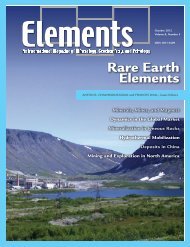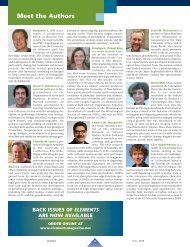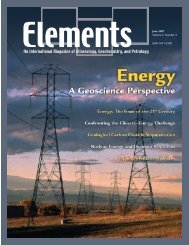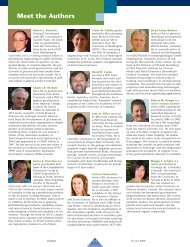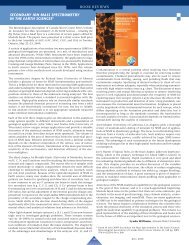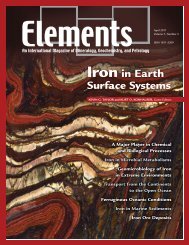Front Matter (PDF) - Elements
Front Matter (PDF) - Elements
Front Matter (PDF) - Elements
You also want an ePaper? Increase the reach of your titles
YUMPU automatically turns print PDFs into web optimized ePapers that Google loves.
EDITORIAL<br />
PRINCIPAL EDITORS<br />
DAVID J. VAUGHAN, The University of<br />
Manchester, UK (david.vaughan@<br />
manchester.ac.uk)<br />
HARRY Y. (Hap) McSWEEN, University of<br />
Tennessee, USA (mcsween@utk.edu)<br />
JAMES I. DREVER, University of Wyoming<br />
(drever@uwy.edu)<br />
SUSAN L. S. STIPP, Københavns Universitet,<br />
Denmark (stipp@nano.ku.dk)<br />
ADVISORY BOARD 2009<br />
JOHN BRODHOLT, University College London<br />
NORBERT CLAUER, CNRS/UdS, Université de<br />
Strasbourg, France<br />
ROBERTO COMPAGNONI, Università degli<br />
Studi di Torino, Italy<br />
WILL P. GATES, SmecTech Research<br />
Consulting, Australia<br />
GEORGE E. HARLOW, American Museum of<br />
Natural History, USA<br />
JANUSZ JANECZEK, University of Silesia, Poland<br />
HANS KEPPLER, Bayerisches Geoinstitut,<br />
Germany<br />
DAVID R. LENTZ, University of New Brunswick,<br />
Canada<br />
MAGGI LOUBSER, University of Pretoria,<br />
South Africa<br />
ANHUAI LU, Peking University, China<br />
ROBERT W. LUTH, University of Alberta, Canada<br />
DAVID W. MOGK, Montana State University, USA<br />
TAKASHI MURAKAMI, University of Tokyo, Japan<br />
ROBERTA OBERTI, CNR Istituto di Geoscienze<br />
e Georisorse, Pavia, Italy<br />
ERIC H. OELKERS, LMTG/CNRS, France<br />
TERRY PLANK, Lamont-Doherty Earth<br />
Observatory, USA<br />
XAVIER QUEROL, Spanish Research Council, Spain<br />
TORSTEN VENNEMANN, Université de<br />
Lausanne, Suisse<br />
OLIVIER VIDAL, Université J. Fourier, France<br />
MEENAKSHI WADHWA, Arizona State<br />
University, USA<br />
EXECUTIVE COMMITTEE<br />
LIANE BENNING, European Association<br />
of Geochemistry<br />
PETER C. BURNS, Mineralogical Association<br />
of Canada<br />
GIUSEPPE CRUCIANI, Società Italiana di<br />
Mineralogia e Petrologia<br />
BARBARA L. DUTROW, Mineralogical<br />
Society of America, Chair<br />
W. CRAWFORD ELLIOTT, The Clay Minerals Society<br />
RODNEY C. EWING, Founder<br />
CATHERINE MÉVEL, Société Française<br />
de Minéralogie et de Cristallographie<br />
MAREK MICHALIK, Mineralogical Society<br />
of Poland<br />
MANUEL PRIETO, Sociedad Española<br />
de Mineralogía<br />
CLEMENS REIMANN, International Association<br />
of GeoChemistry<br />
URS SCHALTEGGER, Swiss Society of<br />
Mineralogy and Petrology<br />
CLIFFORD R. STANLEY, Association<br />
of Applied Geochemists<br />
NEIL C. STURCHIO, Geochemical Society<br />
PETER TRELOAR, Mineralogical<br />
Society of Great Britain and Ireland<br />
FRIEDHELM VON BLANCKENBURG,<br />
Deutsche Mineralogische Gesellschaft<br />
MICHAEL WIEDENBECK, International<br />
Association of Geoanalysts<br />
MANAGING EDITOR<br />
PIERRETTE TREMBLAY, tremblpi@ete.inrs.ca<br />
EDITORIAL OFFICE<br />
490, rue de la Couronne<br />
Québec (Québec) G1K 9A9 Canada<br />
Tel.: 418-654-2606<br />
Fax: 418-653-0777<br />
Layout: POULIOT GUAY GRAPHISTES<br />
Copy editor: THOMAS CLARK<br />
Proofreaders: THOMAS CLARK<br />
and DOLORES DURANT<br />
Printer: SOLISCO<br />
The opinions expressed in this maga zine are<br />
those of the authors and do not necessarily<br />
reflect the views of the publishers.<br />
www.elementsmagazine.org<br />
EVOLUTION AND EXTINCTION<br />
The subject matter of this<br />
issue of <strong>Elements</strong>, like many<br />
excellent ideas, will seem<br />
obvious to other scientists<br />
when put before them. Its<br />
elegance makes it appear<br />
simple. Mineral evolution<br />
provides a sense of progress,<br />
or at least of a progression<br />
from the simple to the<br />
complex, since the explosive<br />
beginnings of our uni-<br />
David J. Vaughan<br />
verse. The idea of a process<br />
of ‘evolution’ that extends back in time for many<br />
billions of years before the emergence of any life<br />
form on Earth is particularly apt at a time when<br />
we have just celebrated the bicentenary of the<br />
birth of Charles Darwin, the man who essentially<br />
gave us biological evolution.<br />
However, there is at least one very<br />
important difference between the<br />
evolutionary development of life<br />
forms and that described here for<br />
minerals: it is that minerals, however<br />
rare, cannot become extinct,<br />
whereas for living organisms<br />
extinction is the rule rather than<br />
the exception. Probably more than<br />
99% of all the organisms that have<br />
ever lived are now extinct.<br />
So what can we say about the Earth<br />
and its ‘systems’ in the context of<br />
evolution and extinction at the beginning of the<br />
year 2010 Chiefly that Earth is a planet dominated<br />
by one mammalian species whose actions<br />
have already led to the extinction of numerous<br />
life forms and threatened the extinction of many<br />
others. At the time of writing this editorial, the<br />
Copenhagen Conference on climate change has<br />
just ended with little real progress towards<br />
dealing with the dangers of greenhouse gas emissions<br />
as the cause of potentially catastrophic<br />
changes in global climate, sea level, ocean currents<br />
and ocean chemistry. I will not dignify the<br />
arguments of the tiny handful of ‘climate-change<br />
deniers’ with an attack on their follies – their case<br />
has been discredited in numerous books and<br />
articles, including many in this magazine. If<br />
global warming continues unchecked, this will<br />
have a devastating impact on the survival prospects<br />
of millions of people and could even portend<br />
the ‘extinction’ of Homo sapiens. The unfortunate<br />
lesson of Copenhagen seems simply to be<br />
that our remarkable technological development<br />
has not been matched by the evolution of the<br />
social and political systems needed to deal with<br />
global problems, particularly if they involve politicians<br />
having to make unpopular decisions.<br />
Minerals, however<br />
rare, cannot become<br />
extinct, whereas for<br />
living organisms<br />
extinction is the rule<br />
rather than the<br />
exception.<br />
What, if anything, might we do as scientists in<br />
the face of this unprecedented challenge Clearly<br />
there is the possibility of contributing to technological<br />
‘fixes’, which include the capture and<br />
storage of greenhouse gases emitted from power<br />
plants and vehicles, the development of alternative<br />
(green) forms of energy, helping to solve<br />
problems associated with existing low- or zeroemission<br />
energy forms (notably the waste-disposal<br />
problems of the nuclear industry), and even<br />
novel ways of modifying Earth’s atmosphere or<br />
the input of heat from the Sun. The latter might<br />
involve some means of directly extracting CO 2<br />
from the atmosphere and disposing of it in the<br />
deep ocean, in deep sedimentary formations, or<br />
through reaction with Mg and Ca in silicate rocks<br />
such as basalts. Other novel proposals include<br />
‘geoengineering’ stratocumulus clouds by<br />
injecting into them a fine spray of<br />
sea salt from the ocean surface<br />
which would act as nuclei to<br />
increase the number of water droplets<br />
and cause them to reflect more<br />
of the Sun’s heat. However, at<br />
present, some deus ex machina total<br />
solution to our climate problems<br />
seems very unlikely. We will surely<br />
need to call upon many of these<br />
ways of reducing the impact of our<br />
human activities on the global climate.<br />
We will also have to accept<br />
the need to make changes in our<br />
lifestyles and the need to help our more threatened<br />
neighbours in poorer countries, both technically<br />
and financially. Amongst the most important<br />
things we can do is to waste no opportunity<br />
to educate our fellow citizens about the dangers<br />
we all face and the terrible price we may all pay<br />
for inaction. It is astonishing, so the pollsters tell<br />
us, that very many of the general public either<br />
do not ‘believe’ in global warming and its consequences<br />
or think that it does not pose a serious<br />
threat to our survival.<br />
The mineral world is remarkably beautiful, but<br />
even those of us who spend our working lives<br />
studying it would not wish to see it ‘evolve’ to<br />
outlast the living world.<br />
David J. Vaughan*<br />
The University of Manchester<br />
david.vaughan@manchester.ac.uk<br />
* David Vaughan was the principal editor in charge<br />
of this issue.<br />
ELEMENTS 3<br />
FEBRUARY 2010



